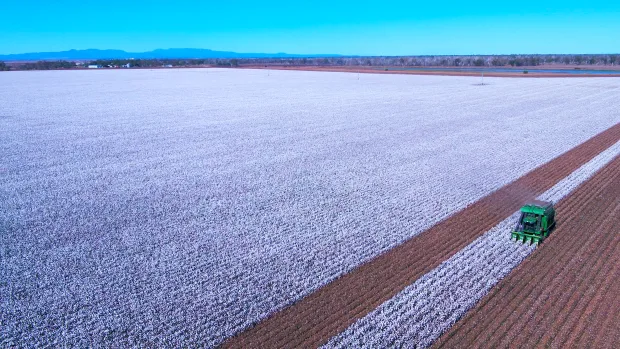China cotton ban raises fears of new trade tactics by Beijing

Image: Collected
The Coalition government fears Beijing's campaign of financial payback against Australia is becoming more complex after cotton became the latest export targeted.
Chinese officials have warned mills to avoid buying Australian cotton, days after state-owned steel producers, and power stations were told to stop importing Australian thermal and coking coal.
Senior government sources fear the most recent tactic of issuing behind-the-scenes edicts to Chinese companies to shift away from Australian goods is less evident than making trumped-up claims of dumping or other breaches trade practices so that it is harder for Canberra and producers to challenge.
In contrast, China this season imposed punitive tariffs of 80 % on barley exports and has launched an investigation into wine exports - actions that may be protested at the World Trade Organisation.
It is understood cotton sales have not been affected yet but mills have been told their import quotas for all cotton will be slashed if they do not comply. If indeed they exceed quotas, a tariff of 40 % is put on cotton.
About 63 percent of Australia's export cotton crop is sent to China and will probably be worth about $800 million in gross annual sales.
While the lack of the Chinese market would be a blow to local cotton growers, the industry is confident a whole lot of products could be diverted to Bangladesh, Indonesia, and Vietnam.
Trade Minister Simon Birmingham said the government was urgently seeking to clarify the problem in consultation with the cotton industry and demanded China not discriminate against Australian products.
"Our cotton exporters been employed by hard to win contracts and establish themselves as reliable suppliers of top quality cotton in the Chinese market, which is an essential input for most Chinese businesses," he said.
"China should eliminate any make use of discriminatory actions against Australian cotton producers. Impeding the power of producers to compete on a level-playing field could constitute a potential breach of China’s international undertakings, which will be taken very seriously by Australia."
Cotton Australia said it had become clear China's National Development Reform Commission was discouraging spinning mills from using Australian cotton.
"To now observe these changes for Australian cotton exports to China is disappointing, particularly directly after we have enjoyed such a mutually beneficial relationship with the united states over a long time," the industry body said in a statement.
Moree farmer Mick Humphries said the most recent China trade hit had come at a bad time as growers planted their cotton crops.
Mr. Humphries, chairman of the Gwydir Valley Cotton Growers’ Association, has just finished planting 200 hectares of cotton and started harvesting barley - two commodities targeted by China in the past six months.
“It is always concerning when trade barriers are placed in place. It looks like it will affect the profitability of the crop but in the long run I believe we can stand by the top quality we grow and hopefully the impact won’t be as profound because they have been with barley,” he said.
Mr. Humphries said there had been no immediate effect on cotton prices, sitting at about $530 a bale.
Rabobank analyst Charles Clack said the short-term impact will be limited because Australia’s drought-affected financial 2020 crop was so small and have been almost entirely sold.
The tensions over trade coincide with revelations by spy agency ASIO that foreign spies were wanting to co-opt future and current politicians and penetrate Australia's intelligence services.
"In all states and territories, at every degree of government, intelligence
services would like to cultivate politicians who'll advance the interests of the foreign country," Director-General of Secretary Mike Burgess wrote in the agency's annual report, adding ASIO had "stepped up its investigations".
ASIO had also foiled a plot by an Australian-based foreign national, dealing with a team of foreign intelligence officers, to attempt to recruit multiple Australian security clearance holders.
"The agents wanted sensitive info on the intelligence community's operations, particularly those directed against their house country," Mr Burgess said.
The ASIO report didn't identify the united states involved but intelligence officials believe up-and-coming local mayors and councillors are being targeted as a result of the prospect they will be elevated into state and federal politics.
Prime Minister Scott Morrison said the federal government had strong protections to guard against foreign meddling.
"I think the report that came out reflects how successful our intelligence agencies have already been," he said.
Source: https://www.afr.com
Previous Story
- Bangladesh praying for trade benefits post LDC graduation
- Surviving Australia's two-week quarantine with a ten-month-old baby
- What to know if you are flying into...
- Travel bubble: New Zealand minister says July is...
- Boycott Google, Facebook to force them to cover...
- Bushfires and Coronavirus Amount to a Double-Hit for...
- IFC launches web portal to monitor resource use...
- Halal travel: the most popular holiday destinations for...